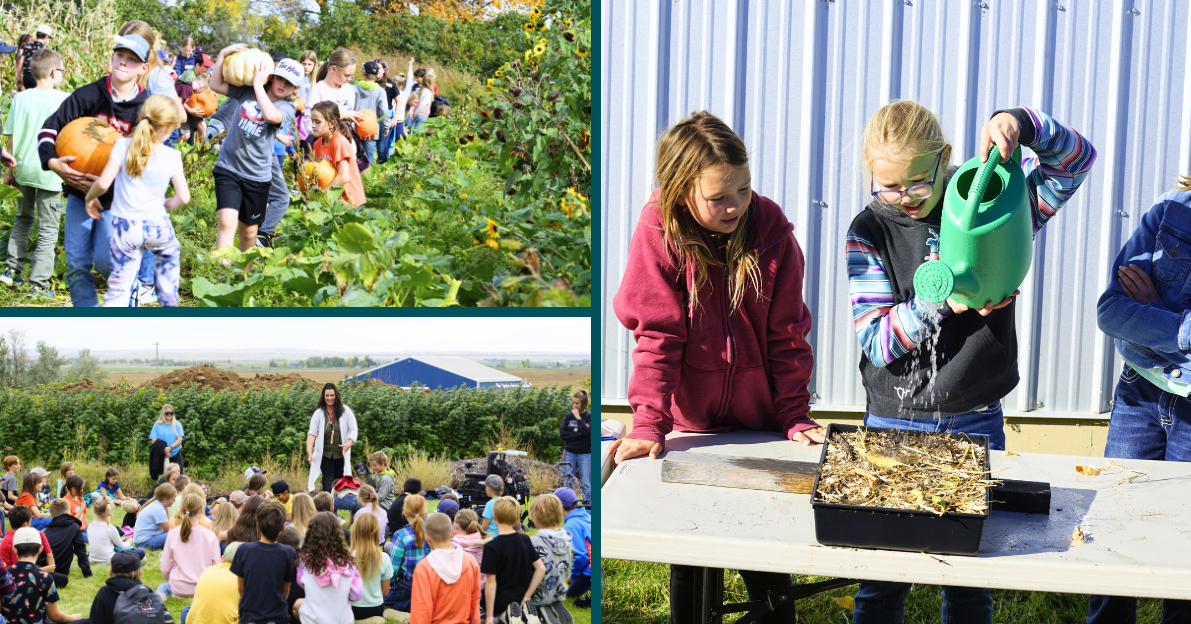
Cross School Project Teaches Students about Agriculture and Trade
Three classes of Grade 5 students from Senator Gershaw School and Irvine School are working together on a cross-school project that will culminate in building three trading post next year.
The first time the students collaborated was a Google Meet where Irvine students explained to those at Gershaw the process of harvesting corn from the garden of the Agricultural Discover Centre (ADC), removing the kernels from the cob and freezing the corn for later use. At the beginning of October, all classes met in person for the first time at Neubauer Farms to harvest pumpkins.
Students met again on October 18 at Senator Gershaw School, where the pumpkins harvested by Gershaw students had been carved and were on display at the front of the stage. Nichole Neubauer was there to teach the students about companion planting and regenerative agriculture. The day started off with an icebreaker using pinto beans in acknowledgment of Pinto Macbean, the town mascot of Bow Island, and the importance of growing beans for agriculture in SE Alberta.
Regenerative agriculture is managing soil erosion from wind and rain either by covering soil or using cover crops. “It’s important to conserve our soil. Topsoil goes down about six inches, probably only about four inches here in SE Alberta. It takes about 100 years to grow one inch of topsoil, this is where all the macronutrients and micronutrients are, which has all the living things we grow our food in,” Neubauer explained to the students.
Following the presentation, the students headed outside to conduct experiments on soil erosion. Neubauer showed the students what happens to bare soil during a heavy rain, particularly for soil on a slight slope. Students were divided into ten groups of six students each, with each group preparing a tray of soil and then covering it with different combinations of materials, such as leaves, grass clipping, coconut fibre, and sawdust.
Following lunch, students created a garden using seeds for corn, beans, and squash (the Three Sisters), which thrive when planted together. Students watched a video about the legend of the Three Sisters and the importance of collaboration. Neubauer explained how beans fix nitrogen from the atmosphere into nodules on their roots, which provides natural fertilizer to the corn and squash.
“That is what companion planting and regenerative agriculture looks like and how we can use companion planting and the power of nature to grow more food in a harmonious way. That’s what we will learn about today when we go out later today and create our very own Three Sisters Garden,” said Neubauer.
In late November, students will meet at Irvine School with an architect to have a blueprinting session for the trading post buildings. Weather permitting, the first build is scheduled for January 21, 2025, with two more building days to follow. Students from both schools will also do a fundraiser where they will prepare a hot lunch using crops harvested from the ADC garden and the Three Sisters Garden. Money raised from the fundraiser will go toward an end of year overnight stay in Elkwater for all three classes.
Jessica Shigehiro, Grade 5 teacher at Senator Gershaw, said, “the project has been going well on all ends, with students coming up with names, (for their trading posts) and inquiry-based questions and discussions on the fur trade. The students have learned coding on Minecraft Education and developed their trading post on there, which is a part of the Grade 5 science curriculum. Students were very engaged and interacted extremely well with each other on Friday (Oct. 18). The three sisters’ crops are planted, watered and we are hoping for some growth over the winter months so we can harvest our vegetables. My students and all of the parents are extremely excited about this project.”
By Samantha Johnson, Prairie Rose Public Schools Content Writer







